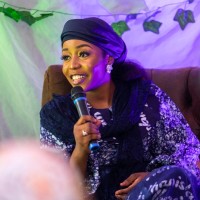 |
| Maryam Bukar Hassan |
Maryam Bukar Hassan (Alhan Islam) is a young poet (spoken word artist) who is making waves in Nigeria and abroad. She has appeared at a number of venues both domestically and internationally, including the United Nations. In this interview, the 27-year-old Kaduna-born Borno State native discusses her path as a poet, the influence of her poems on society, and other topics.
Can you describe your journey into spoken word poetry? What inspired you?
Inspired by my late mother, Hauwa Maina, who advocated for justice, I began writing as a method to express my feelings. At the age of 16, I performed my first piece in a video called Violence Has No Religion, which had a strong emotional impact on the audience. The comments, particularly from someone who altered their conduct after reading my poetry, indicated that my words might have an impact.
I experimented with combining genuine emotions, vivid images, and rhythm to make my poems more dramatic and approachable. Over time, I let my activism for justice, gender equality, and peace define the subjects of my writing. Performing on multiple platforms allowed me to fine-tune my performance and ensure that my voice connected with the audience.
Finally, my style is a mirror of my path, personally personal yet globally relevant to the hardships and victories of others I hope to inspire.
Personally, the spoken word has given me a feeling of purpose and empowerment. It has enabled me to connect with a variety of audiences, express my truth, and inspire others to do the same. It has been a source of healing for me, transforming suffering and obstacles into work that promotes hope and transformation. The spoken word has formed who I am, anchoring me in resilience and reminding me of the boundless power of words to affect.
When it comes to producing fresh ideas, I frequently begin by reflecting on my feelings or current events. I watch the world, listen to people’s tales, and then translate those experiences into poems. Conversations, literature, daily hardships, and achievements all provide me with motivation. Poetry is my method of digesting the world and transforming it into something others can understand.
I also get inspiration from my experiences and the world around me, whether it’s a personal challenge or something I see in the community. The words come to me gradually, and I frequently review what I’ve written, altering it until it seems perfect. I rely on my instincts and enthusiasm for the subject matter to lead me through the process, and each new poem seems like a step forward in my continual path of self-expression.
Preparing for a show entails preparing the presentation as well as the poem itself. I practice in front of a mirror or record myself to improve my delivery, concentrating on tone, pace, and body language. It is critical for me to connect with the audience, so I spend time thinking about the feelings I want to elicit and the energy I need to bring to the stage. I also keep myself psychologically anchored, frequently by reciting the Qur’an or engaged in profound meditation, so that I may act with honesty and strength.




